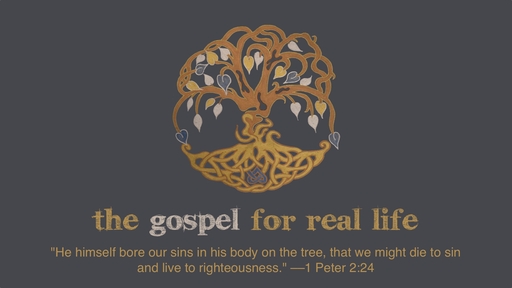1 Peter 1:1-2
Sermon • Submitted • Presented
0 ratings
· 4 viewsNotes
Transcript
1 Peter, an apostle of Jesus Christ, to the strangers scattered throughout Pontus, Galatia, Cappadocia, Asia, and Bithynia, 2 Elect according to the foreknowledge of God the Father, through sanctification of the Spirit, unto obedience and sprinkling of the blood of Jesus Christ: Grace unto you, and peace, be multiplied.
Introduction
Introduction
Peter introduces and addresses his letter.
Peter introduces and addresses his letter.
Peter identifies himself as the author.
Peter identifies himself as the author.
The fact that Peter is the author of this letter sets up so many expectations for readers who are familiar with his role in the early days of Christianity.
Those familiar with the gospels might expect to see the brash and bold Peter from the stories they have heard from his time walking with Jesus.
Others may know Peter primarily from his time as a steady leader of the early church in Jerusalem.
This letter is written much later in Peter’s life.
With a likely date of 62-63 AD, Peter is 30-35 years removed the events of the gospels or the early events of the church in Jerusalem, such as Pentecost.
In fact, there is a high probability that Peter is about 1-2 years from martyrdom at the hand of Nero.
What we read in 1-2 Peter are the words of the aged and mature Peter that has seen the fire of youth tempered by the experiences of life.
Some have tried to belittle Peter’s intelligence over the years.
Don’t let that mislead you into thinking that this is a letter of low-intelligence.
We typically base our estimation of Peter’s intelligence off of the accusation of the religious elite that Peter and John were unlearned and ignorant men in Acts 4:13.
This is unfair to Peter and John for 2 reasons.
It’s a label placed on them by their enemies.
It has more to do with their lack of titles and degrees than their IQ.
We look at these men as fishermen and picture Peter as a Cletus character.
Peter’s got a flannel shirt on unbuttoned with the sleeves cut off.
Johns out there in a wife beater and a dirty hat.
These men, however, are small business owners.
They’re working with suppliers and buyers.
They’re researching new equipment.
They aren’t ignorant, they just aren’t part of the religious elite.
Peter addresses his primary audience.
Peter addresses his primary audience.
He calls them the scattered strangers.
First off that sounds like an excellent title for a book.
It’s not though, it’s a title that applies to the people Peter is addressing.
Honestly, it is a title that applies to us today, as well.
Let me tell you why.
It has to do with the matter of identity.
Peter names 5 provinces that are all situated in modern day Turkey.
Pontus, Galatia, Cappadocia, Asia, and Bithynia.
These are all provinces inhabited by Christians.
People from 3 of these provinces were present in Jerusalem on the day of Pentecost.
Galatia, of course, had received a letter from the Apostle Paul.
In those days, where you were from told a lot about what kind of person you were.
Just because you became a Christian, it didn’t mean you lost your sense of regional pride.
Dark times were coming however, when Christians would be facing elevated levels of persecution or pressure to conform.
Peter is trying to prepare them for that in this letter.
15 times he mentions persecution.
He uses 8 different greek words to describe it.
The Christians of Asia would soon face the prospect of their home state or city becoming an inhospitable place for Christians.
This can be a destabilizing experience for someone.
To no longer be welcome at home?
To feel like the place of your nativity is cut off from you because of your faith?
That’s why Peter refers to them as the scattered strangers.
Let’s consider what the word strangers means, here in this verse.
How many of you had to watch videos in school about stranger danger?
Scary van.
Guy wearing a black jacket and a ski mask.
That’s not what Peter is talking about here.
How many of you have ever traveled to a different country?
No one speaks your language.
They don’t eat your food.
They have different priorities than you.
This is the experience of the stranger.
The word that Peter uses can also be translated as alien, sojourner, or pilgrim.
This is the identity that Peter wants his readers to adopt.
This is because they are not home.
Which leads us to the next word.
They are scattered.
Peter uses a specific, technical term, you may have heard it before, DIASPORA.
It is a term used to describe the dispersal of the Jewish people from their homeland.
Here Peter, a Jew, uses it to describe Christians.
He wants his readers to be careful viewing the land they live in as their home.
With persecution on the horizon, Peter’s readers need to remember their status as pilgrims in this current world.
You say, well that is kinda discouraging.
Are you saying Christians are kind of like the man with no nation?
Not all.
The title of scattered strangers heavily implies that somewhere we are known citizens at home.
That place is a real place called heaven.
An actual location where we will dwell in the presence of our God and Savior.
What is it that sets us apart from the people we live around?
Why do we carry this identity of scattered strangers?
Peter reminds them.
Peter describes the manner in which his readers got saved.
Peter describes the manner in which his readers got saved.
Or to put it another way, how they became citizens of a different country.
In the process of salvation, Peter highlights the role of each member of the trinity.
Just like you can read through scripture and find each member of the trinity active in creation.
You can also read about each member of the trinity and their activity in saving your soul.
The first activity involved with our salvation has to do with our election by God.
This was done, according to the foreknowledge of the Father.
Ironside reminds us that there is nothing fatalistic or arbitrary about election as taught in the Bible.
I believe this verse should be understood within the context of scripture to mean.
Jesus is the Lamb slain before the foundation of the world.
Before the foundation of the world, God elected to receive all those whom He foreknew would believe in Jesus.
Ironside also said that the gospel is to be preached to all, and all who believe may be assured that they are among the elect.
We are, therefore, strangers in this world because God has elected to receive those that believe and are saved.
The second activity that we see is the part that the Spirit accomplishes.
The spirit sanctifies us to obedience.
This is very reminiscent to Paul’s words in Ephesians 2:10 “10 For we are his workmanship, created in Christ Jesus unto good works, which God hath before ordained that we should walk in them.”
God has elected to allow us citizenship in His country.
He does so with the intention that we would obey Him as His subjects.
That word sanctification means to be set apart.
As citizens of another country, we are first required to obey the laws of our rightful ruler.
You will recall that Peter, in his younger days, demonstrated where his loyalties lied.
When the Jewish rulers commanded him to cease preaching about Jesus, Peter responded in Acts 5:29 “29 Then Peter and the other apostles answered and said, We ought to obey God rather than men.”
Peter could say that because he understood that he was a stranger scattered.
The Spirit had set him apart to obey a new King.
Finally, Peter appeals to the work of his Savior, Jesus.
It seems a little out of place, to speak of sprinkling Jesus’ blood.
In other places and in our songs of worship, we talk about being washed in the blood, we talk about a fountain filled with blood.
What’s the deal with this sprinkling?
Throughout these two verses, we have seen Peter’s Jewishness coming out.
He refers to Christians as the diaspora, a term used for displaced Jews.
He refers to Christians as a special people, an idea that had previously been reserved for the Jews.
Now, I believe, Peter’s Jewishness is coming out again with this mention of sprinkling blood.
In Judaism, the sprinkling of blood had 3 primary uses.
It was used to denote obedience to the covenant between God and the Israelites.
When they sealed the covenant, Moses sprinkled the people with blood.
They responded by pledging to do all that God had commanded them.
Blood was also used to mark someone who had been set aside for service.
Moses did this with Aaron and his sons when they were marked for service as priests.
Blood was used to indicate something had been made clean.
This is where our minds most commonly go when we think about the blood of Jesus.
Rightfully so.
It is His blood that cleanses us from our sins.
This special choosing, this sanctification and cleansing, this has been made available to all people.
Regardless of your ethnicity.
Regardless of your provincial origination.
The citizenship of heaven has been made available to all.
Anyone can become a stranger scattered on this earth.
Application
Application
So what? What are we supposed to do with this?
Peter tells us.
We should rest in the grace that God has showed us.
When we do, our peace will be multiplied.
One cannot look around at this earth and not come to the conclusion that it is wholly inadequate to satisfy.
Whether you are facing persecution or not, but certainly during times of trouble, we are convinced of this.
The world is cursed.
We can see it and feel it.
Paul essentially says in 1 Corinthians 15:19 that if this world is all there is, “we (as christians) are of all men most miserable.”
Praise God this world isn’t all there is.
For us, as believers, we are strangers in this world.
We are dispersed and scattered apart from our true homeland.
When things on this earth don’t go the way they’re supposed to, we shouldn’t be surprised.
When we feel like we don’t fit in, it’s cause we aren’t supposed to.
C.S. Lewis said “I must keep alive in myself the desire for my true country, which I shall not find till after death; I must never let it get snowed under or turned aside; I must make it the main object of life to press on to that country and to help others to do the same.”
Other people need to know how they can become a part of God’s kingdom too.
They need to know that God has already decided to receive them.
They need to know that the Spirit will enable them to live for God.
They need to know that the blood of Jesus can cleanse them from their sins.
Conclusion
Conclusion
There is a quote that says, “The world is a bridge. The wise man will pass over it, but he will not build his house upon it.”
If you are troubled by the things you see around you, you need to remember, we are just strangers here separated from our true home.
If you are not saved, then you need to realize that this world is the best you’re going to get.
But it doesn’t have to be that way.
God has already chosen to receive you.
Jesus has already shed his blood for you.
The Spirit stands ready to set you apart for a better world.
ADVERTISEMENT
Related Media
See moreRelated Sermons
See more

Dale Bible Church • 23 views • 43:12


New City Fellowship • 27 views • 29:20


Bible Baptist Church • 8 views • 33:24



